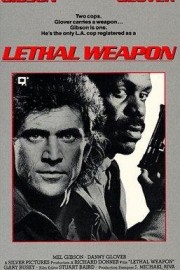Lethal Weapon
One of the most unfortunate DVD happenings of the past few years has been the lack of a definitive box set for Richard Donner and Joel Silver’s “Lethal Weapon” franchise back in 2007 to commemorate the original film’s 20th anniversary. Perhaps a casualty of Mel Gibson’s recent controversies, most especially the 2006 DUI arrest and his anti-Semetic rant?
Whatever the reason for Warner Bros. decision, hopefully we’ll get one in the future if Gibson is able to rehabilitate his recent imagine, ’cause let’s face it, this franchise deserves it.
It certainly starts off on a bold note- a half-naked hooker (latter discovered to be the daughter of one of Danny Glover’s old Vietnam buddies), who we’ve seen doping up, jumps from an L.A. high-rise during the holidays.
Next, we’re introduced to the principals. Roger Murtaugh (Glover) is turning 50. He’s brought his cake in the bathroom while taking a bath by his family (including wife Darlene Love and older daughter Traci Wolfe). Contrast that with Martin Riggs (Gibson), alone and naked in a trailer. Well, his dog’s there, but when he opens a beer and lights a cigarette to start the day, we know just about everything we need to about the character. We also know from pictures seen around the trailer that he used to be married.
The original script by Shane Black (who continued to define modern action flicks with his work on “The Long Kiss Goodnight,” “The Last Boy Scout,” and his directorial debut “Kiss Kiss Bang Bang”) was supposedly much darker than what got onscreen, but Donner, Gibson and Glover deliver the goods with action, humor, and an irrepressible chemistry by Gibson and Glover. I won’t get into the deeper story about Vietnam special ops units smuggling in heroin and how it ties into the hooker dying- if you’ve seen the movie, you know it already; if you haven’t, Donner’s film is the best way to experience it for the first time.
The ’80s were a boom time for action. Between Schwarzenegger and Stallone, the mega-testosterone genre was in its’ heyday. But where “Lethal Weapon”- and a year later, “Die Hard”- excelled and made lasting impressions were in the way they redefined the action film for the future. Apart from setting the standards for how to shoot action, they also provided a new type of action star- one that wasn’t afraid to cry onscreen, one that was vulnerable. In essence, one that audiences could better identify with. Black may not have been satisfied with the direction the story went- especially in the sequel, which he wrote the story for, but later refused script credit for- but in the odd couple of Gibson’s on-the-edge cop and Glover’s family man father figure, audiences bought the connection hook, line, and sinker.
A later-released director’s cut of the original (although 2 and 3 also got the treatment) brings more to the story, and helps define the characters further. An early film sequence with Riggs walking right into the line of fire of a school shooter is even more important than the originally-seen sequence of him taking down drug dealers in a Christmas tree lot in showing just how close to the edge he is. The result is a bit darker, more dramatic thriller than the jokey action mayhem that would permeate into the sequels (although “Lethal 2” carried over a lot of that edge). It’s still just about the best thing Donner has ever directed (and yes, that includes “Superman: The Movie” and the underrated “16 Blocks,” which brought he and “Die Hard” star Bruce Willis full-circle in a genre they both helped event), and Gibson and Glover have rarely been better.
And then there’s the music. For me, the soundtrack for this is one of those “holy grail” offerings I hope to add to my collection one day. I have the soundtracks for the second and third films in the franchise, and admittedly, Michael Kamen and Eric Clapton’s music didn’t really change a whole lot from film to film, but like the films that came after it in the series, their distinctive signature on both the action and the character-driven moments (as well as the songs Donner and co. used to accentuate the drama) is a big reason for the film’s overall success.
“Lethal Weapon” is best known as a “buddy movie,” but the fact of the matter is, watching it again, you can see it’s influence in more than just that action subgenre. Some of its’ decedents- I would argue- include films you might not expect: apart from the aforementioned “Die Hard” and “16 Blocks”- not to mention Black’s later efforts in the genre- I can see elements of “Weapon,” however slight, in Scorsese’s “The Departed,” Michael Mann’s “Collateral” (and certainly his “Miami Vice” film), Michael Bay’s “The Rock,” and even a film like John Woo’s “Hard Boiled,” where two cops reluctantly partner up to take down a major gun-running operation. And then, there’s always “Pulp Fiction,” with Tarantino turning the formula on its’ head, and turning it into a pop culture fever dream where words speak louder than actions.
But that’s a discussion for another time. For now, it’s a good idea to just pop in Donner’s buddy movie original and revel in the moments that have made it a cinematic classic in its’ own right. The family dinner. The jumper. The Three Stooges distraction. And, of course, “I’m getting too old for this shit.”
I don’t know about Murtaugh, but I’ll never be too old to enjoy this film.










